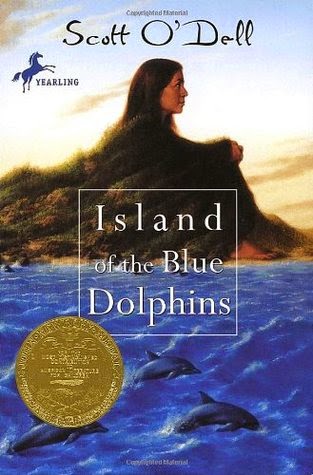I do feel like this was written in a way that would be effective for a younger audience. The language is quite simple, and although the story is affecting (twenty years! Alone! On an island!), I sometimes found myself wishing for a bit more complexity. There would definitely be much to discuss if this book was taught in a classroom setting.
Nicole mentioned that she tended to read books with female main characters when she was younger - well, here you go. Not only is she the main character, for most of the book she's the ONLY character. Many of her people (the Ghalas-at) are killed off by a rival tribe (the Aleuts) near the beginning of the story. She illustrates that the women of her tribe are very capable, picking up the slack when many of the men have been killed: “During this time other women were gathering the scarlet apples that grow on the cactus bushes and are called tunas. Fish were caught and many birds were netted. So hard did the women work that we really fared better than before when the hunting was done by the men.” OH SNAP - take that, you patriarchal aboriginal dudes.
A ship of white men comes to help the tribe move, but the protagonist, Karana, realizes her younger brother has been left behind and leaves the ship to retrieve him. The ship leaves, and her brother is subsequently killed by wild dogs (I have no idea if this part is true - if it isn't, the author is kind of a bastard). So she hangs out, gathering food, learning how to build stuff (this statement rang so true for me: “I had seen the weapons made, but I knew little about it. I had seen my father sitting in the hut o winter nights scraping the wood for the shafts, chipping the stones for the tips, and tying the feathers, yet I had watched him and really seen nothing. I had watched, but not with the eye of one who would ever do it.”)
 |
| Photo by David McSpadden |
She also has to fight off wild dogs, one of whom she eventually tames. She develops a special relationship with many animals on the island (again, this might be pure sentimental fantasy on the part of the author, although the man who 'rescued' her did say she was found living in a hut with a dog). At one point the Aleuts come back to hunt for sea otter, and she stays hidden from them but meets a girl who is traveling with them, and has a friend for a very short while.
I like that Karana is such a strong, capable character, methodically going about using the skills she has and developing ones she needs to keep herself safe, fed and sheltered.
It's a strange book. In a way it was like watching Castaway, that Tom Hanks movie - you can't conceive of spending hours watching or reading one person's lonely years like that. And then you do, and it's over, and you feel weird.




3 comments:
I liked this book as a kid but I didn't remember it very well until I re-read it with Noah two or three years back. He liked it but he didn't love it. I think it might be more up June's alley when she's a bit older.
I'm with Steph - I know I read it but I don't remember much about it. OMG it was a true story? 20 years? That's crazy.
Yay - a girl based book!
I loved this book so much as a kid. It was one of about 10 books I recall reading for school and loving along with Tuck Everlasting, Johnny Tremain, and The Witch of Blackbird Pond. Oldest read it a couple of years ago and enjoyed it, but it didn't take up a place in his heart like it did for me. Thinking I might have to reread it but don't want to ruin the memory of loving it so.
Post a Comment